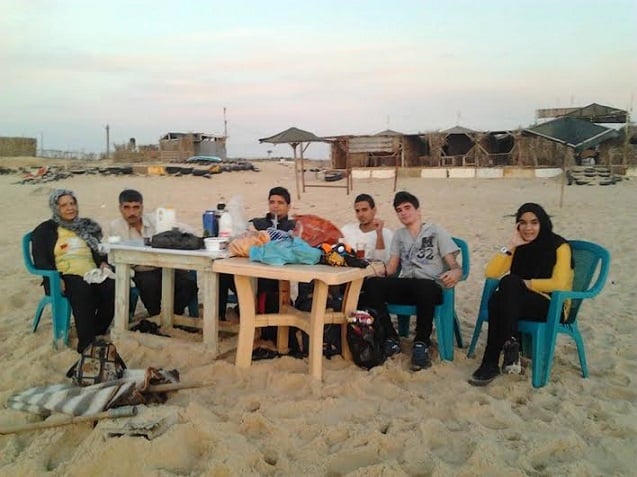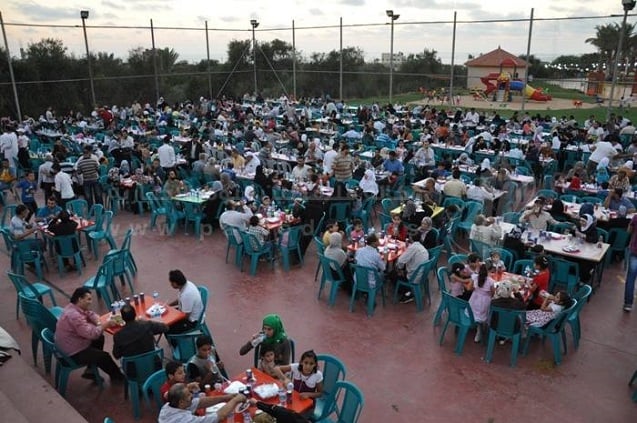
Honest, paywall-free news is rare. Please support our boldly independent journalism with a donation of any size.
Forced out of Syria by civil war, Palestinian refugees who had known no other home have fled to Gaza, where they are welcomed but unable to enjoy the basic economic and physical security they had in Syria.
Belatedly, the entire world is now aware of the humanitarian crisis that has overwhelmed the Yarmouk “camp” for Palestinian refugees in southern Damascus, Syria. Home since 1957 for more than 160,000 Palestinians whose families were forced out of Israel, the dense community of less than a square mile became the focus of conflict in September. Factions on opposing sides of the Syrian civil war used Yarmouk as a staging ground, causing all but about 20,000 of the residents to flee to relative safety elsewhere in Syria or in neighboring countries.
Today, the focus is on the starving residents who remain in Yarmouk, under siege by the Syrian army and its allies. But little to no attention is given to just where the other 140,000 Palestinians are now, and how they are managing to eke out a living. More than 1,500 of them – about 280 families – have gone from one deeply troubled hot spot to another – the Gaza Strip. And although they were welcomed with open arms despite the high unemployment and tight restrictions on movement and trade imposed by Israel, they must now cope with calamity of a different sort.
Fareed and Suad Yousef, along with their five sons and daughter, lived all their lives in Syria. Their parents were natives of what is now Haifa, Israel, but had been forced to make a new home elsewhere after Israel was created in 1948. They longed to return to their ancestral home, but conditions in Syria – in Yarmouk in particular – were relatively good. And although Syria withheld full citizenship from the 450,000 Palestinian refugees sheltering within its borders, “we were treated pretty much the same,” says Mohammed, the second-eldest son, now 28.
 Mohammed Yousef’s family finds some rare respite on the beach in Gaza. From left, Suad, 54; Fareed, 58; Yousef, 22; Ahmad, 26; Seif, 16; and Zeena, 14. (Photo: Mohammed Yousef)
Mohammed Yousef’s family finds some rare respite on the beach in Gaza. From left, Suad, 54; Fareed, 58; Yousef, 22; Ahmad, 26; Seif, 16; and Zeena, 14. (Photo: Mohammed Yousef)
Yarmouk’s streets were lined with shops and filled with taxis and buses. Residents were primarily professionals – including Suad, a civil engineer, and Mohammed, who followed in his footsteps and studied electrical engineering. In his spare time, Mohammed volunteered at the Jafra Foundation, helping youths learn about and celebrate their Palestinian heritage, lest they forget.
That peace and semblance of prosperity came to an end, however, with the eruption of the civil war.
“Most of the people who lived in Yarmouk were against (President Bashar) Assad, but they had no weapons,” Mohammed said. “They didn’t take up arms, and we did not want anyone from either side of the fighting to come in.”
That proved to be a futile hope, however, and Yarmouk became “ground zero” for pitched fighting between pro- and anti-government forces. In December 2012, with Russian MiGs shelling their community, the Yousefs fled along with most of the other residents. They heard later that their house was bombed shortly after. About 2,000 Yarmouk residents found shelter at a nearby school operated by the United Nations, where they spent the next four months – 30 persons to a room.
However, the school was near an army base, and the fighting continued around them. The families felt their only choice was to flee Syria altogether. For Mohammed, there was an extra incentive: Although not official Syrian citizens, Palestinian refugees still were expected to serve in the army. And since Mohammed had completed his education, he had been living on borrowed time. If he stayed any longer, he most certainly would be conscripted into the military.
At the time, Egypt was one of the few neighboring countries that would accept the refugees without a visa. And in March 2013, many of the former residents of Yarmouk, including the Yousefs, fled across the border. The family left behind their oldest son, Hussein (now 30), and Mohammed’s fiancé, Alaa. The Yousefs didn’t have enough money to bring the entire family, and they had no way of knowing that just four months later, the Egyptian military would take advantage of widespread unhappiness with President Mohammed Morsi and stage a coup. Palestinians were perceived as sympathetic to Morsi and his Muslim Brotherhood – and Egypt slammed its doors shut. Visas are now required for Palestinian refugees, and they aren’t being granted.
“I can only afford to communicate with my fiancé by text message,” Mohammed said. “I have no idea when I will ever see her again.”
In Egypt, the Yousefs stayed with friends for a week, but anti-Palestinian sentiment was running high and no help was offered. In desperation, they crossed into Gaza on April 1.
“The people here have opened their arms and said welcome,” Mohammed said. “But there are no jobs for us, and we don’t know how we will survive.”
Omar Mansour, one of Mohammed’s new neighbors, agrees. “We welcome them. They came with nothing other than their documents. We know how they feel, because most people here are refugees themselves. But we don’t have many resources of our own.”
And while Gaza is quieter than Syria is these days, the Palestinians there also know what it is like to live in fear. Even as we chatted over Skype, the connection was lost at one point when the sound of Israeli bombing in the distance grew louder.
Although the Hamas-led government has pledged to give the newly arrived refugees free accommodation in an apartment complex under construction with funds from the Qatar Foundation, Mohammed is skeptical that that gift will ever materialize for the mostly secular families from Yarmouk. The family that has taken in the Yousefs has not yet insisted on rent, but he does not know how long their generosity can last. Meanwhile, Fareed has injured his back and requires surgery. The uncertainty and fear is enough to cause Fareed and Suad to think about returning to Syria no matter what the conditions. But for Mohammed, there is no turning back. The Syrian military is not an option he could accept. And at the end of the year, his Syrian ID will expire – making it even more difficult for him to return, even if peace were achieved somehow.
 Even money for food is hard to come by for the Yarmouk refugees in Gaza. Mohammed Yousef and eight others have formed a committee to help and organized this meal for Ramadan. (Photo: Mohammed Yousef)
Even money for food is hard to come by for the Yarmouk refugees in Gaza. Mohammed Yousef and eight others have formed a committee to help and organized this meal for Ramadan. (Photo: Mohammed Yousef)
Media that fights fascism
Truthout is funded almost entirely by readers — that’s why we can speak truth to power and cut against the mainstream narrative. But independent journalists at Truthout face mounting political repression under Trump.
We rely on your support to survive McCarthyist censorship. Please make a tax-deductible one-time or monthly donation.